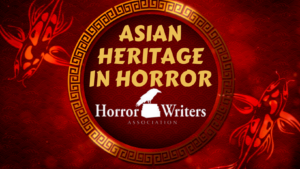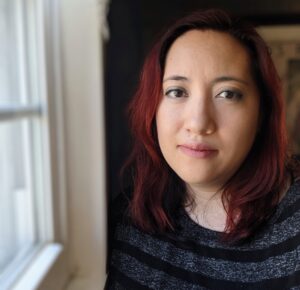Asian Heritage in Horror: Interview with Nadia Bulkin

 Nadia Bulkin is the author of the short story collection She Said Destroy (Word Horde, 2017). She has been nominated for the Shirley Jackson Award five times. She grew up in Jakarta, Indonesia with her Javanese father and American mother, before relocating to Lincoln, Nebraska. She has two political science degrees and lives in Washington, D.C.
Nadia Bulkin is the author of the short story collection She Said Destroy (Word Horde, 2017). She has been nominated for the Shirley Jackson Award five times. She grew up in Jakarta, Indonesia with her Javanese father and American mother, before relocating to Lincoln, Nebraska. She has two political science degrees and lives in Washington, D.C.
What inspired you to start writing?
I’ve enjoyed telling stories (as well as absorbing them) since before I could write on my own. What I like now is the same thing I liked at that age: a satisfying plot arc. And what made a plot arc satisfying to me was a sense of consequence and resolution and implication. I do like words, so I’m happy with my chosen medium, but I’m not much of a stylist.
What was it about the horror genre that drew you to it?
Horror is maybe the most popular style of story-telling in Indonesia, where I spent the first eleven years of my life – instead of cartoons, I used to watch imported Chinese horror movies at 8 a.m. on Saturday mornings. I thought scary stories were exciting and dangerous and the fact that these movies kept me up at night showed me that they had real power.
Do you make a conscious effort to include Asian Diaspora characters and themes in your writing and if so, what do you want to portray?
I do! This is partly about writing “what I know,” and partly about increasing the availability of Asian characters that feel more three-dimensional and less conventional.
What has writing horror taught you about the world and yourself?
I think that my views of the world have more of an impact on my approach to horror-writing than vice versa, and is the reason that my endings tend to be bleak. Maybe the biggest thing I’ve learned from writing horror is that killing monsters does not make a satisfying plot arc, for me.
How have you seen the horror genre change over the years? And how do you think it will continue to evolve?
In the U.S. (where I live), I think more space is being made, slowly, for horror that isn’t grounded in the white male experience (even as a self-critique). And globally, I think more space is being made more quickly for different stylistic expressions of horror. I hope and expect both of these trends to continue, though I doubt the former will be easy. I think it’ll be interesting to see how a horror community that takes pride in being “outsiders” expands to accommodate more POVs.
How do you feel the Asian community has been represented thus far in the genre and what hopes do you have for representation in the genre going forward?
A lot of horror imagery that’s prevalent today has Asian roots (e.g. the pale ghost woman with long black hair over her face is how onryō were depicted in kabuki plays), thanks to the J-horror/K-horror boom in the ‘00s. But to get depictions of a living Asian community, you have to go to Asia. I would hope that in the future, the Asian diaspora gets representation that goes beyond “superstitious old person” and “disposable airhead.”
Who are some of your favorite Asian characters in horror?
I have a soft spot for Alfie in the May the Devil Take You series, because she’s much more of a tomboy and a ne’er-do-well than you typically see for Indonesian heroines. I also really like Lim Ji-oh from the first Whispering Corridors movie, because she’s so defiant and resilient.
Who are some Asian Diaspora horror authors you recommend our audience check out?
J.A.W. McCarthy, K.P. Kulski, Lee Murray, Geneve Flynn, Rena Mason, Christina Sng, Ai Jiang, Yi Izzy Yu. I highly recommend checking out the anthology Black Cranes, which won the Stoker last year, and the upcoming essay collection Unquiet Spirits (February 2023).
What is one piece of advice you would give horror authors today?
Push yourself out of your comfort zone.
And to the Asian writers out there who are just getting started, what advice would you give them?
Be true to your experience. Write the stories and characters you would have wanted to read. Trust that there is an audience for your work.



